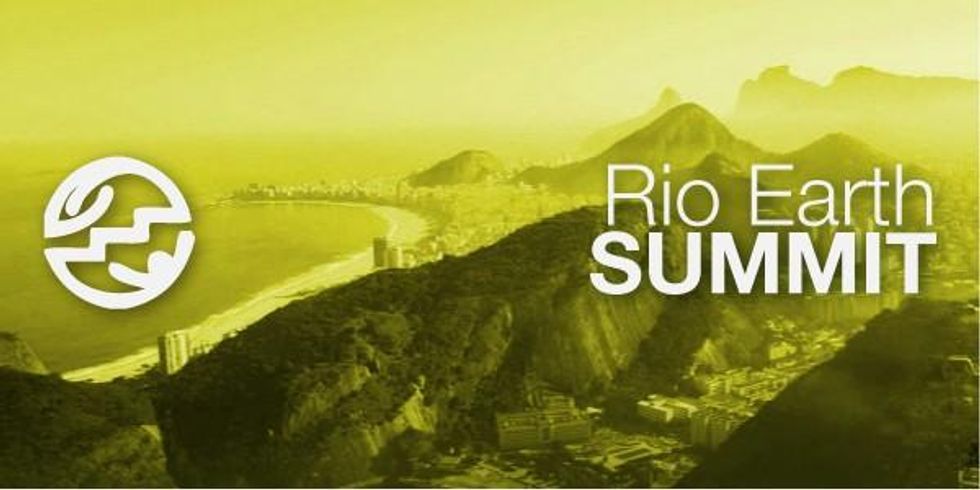

SUBSCRIBE TO OUR FREE NEWSLETTER
Daily news & progressive opinion—funded by the people, not the corporations—delivered straight to your inbox.
5
#000000
#FFFFFF
To donate by check, phone, or other method, see our More Ways to Give page.


Daily news & progressive opinion—funded by the people, not the corporations—delivered straight to your inbox.
In 1992, the Rio Earth Summit brought world leaders together around the frame of "sustainable development" and launched global agreements on biodiversity, climate change and desertification. Two decades later, the environmental and economic crises they had hoped to stave off--global warming, record extinction rates, depleted fisheries, vast economic inequality--are upon us.
In 1992, the Rio Earth Summit brought world leaders together around the frame of "sustainable development" and launched global agreements on biodiversity, climate change and desertification. Two decades later, the environmental and economic crises they had hoped to stave off--global warming, record extinction rates, depleted fisheries, vast economic inequality--are upon us. And so political leaders and grassroots activists are gathering again in Rio in late June to take up the planet's most pressing issues. Here are 10 things you should know about the Summit:

The Rio Earth Summit is presenting us with a false choice between environmental protection through private profit on the one hand and state-sponsored green growth on the other. What we really need is a multilateral process that supports local living economies, and public institutions to democratically manage the commons.
Dear Common Dreams reader, The U.S. is on a fast track to authoritarianism like nothing I've ever seen. Meanwhile, corporate news outlets are utterly capitulating to Trump, twisting their coverage to avoid drawing his ire while lining up to stuff cash in his pockets. That's why I believe that Common Dreams is doing the best and most consequential reporting that we've ever done. Our small but mighty team is a progressive reporting powerhouse, covering the news every day that the corporate media never will. Our mission has always been simple: To inform. To inspire. And to ignite change for the common good. Now here's the key piece that I want all our readers to understand: None of this would be possible without your financial support. That's not just some fundraising cliche. It's the absolute and literal truth. We don't accept corporate advertising and never will. We don't have a paywall because we don't think people should be blocked from critical news based on their ability to pay. Everything we do is funded by the donations of readers like you. Will you donate now to help power the nonprofit, independent reporting of Common Dreams? Thank you for being a vital member of our community. Together, we can keep independent journalism alive when it’s needed most. - Craig Brown, Co-founder |
In 1992, the Rio Earth Summit brought world leaders together around the frame of "sustainable development" and launched global agreements on biodiversity, climate change and desertification. Two decades later, the environmental and economic crises they had hoped to stave off--global warming, record extinction rates, depleted fisheries, vast economic inequality--are upon us. And so political leaders and grassroots activists are gathering again in Rio in late June to take up the planet's most pressing issues. Here are 10 things you should know about the Summit:

The Rio Earth Summit is presenting us with a false choice between environmental protection through private profit on the one hand and state-sponsored green growth on the other. What we really need is a multilateral process that supports local living economies, and public institutions to democratically manage the commons.
In 1992, the Rio Earth Summit brought world leaders together around the frame of "sustainable development" and launched global agreements on biodiversity, climate change and desertification. Two decades later, the environmental and economic crises they had hoped to stave off--global warming, record extinction rates, depleted fisheries, vast economic inequality--are upon us. And so political leaders and grassroots activists are gathering again in Rio in late June to take up the planet's most pressing issues. Here are 10 things you should know about the Summit:

The Rio Earth Summit is presenting us with a false choice between environmental protection through private profit on the one hand and state-sponsored green growth on the other. What we really need is a multilateral process that supports local living economies, and public institutions to democratically manage the commons.